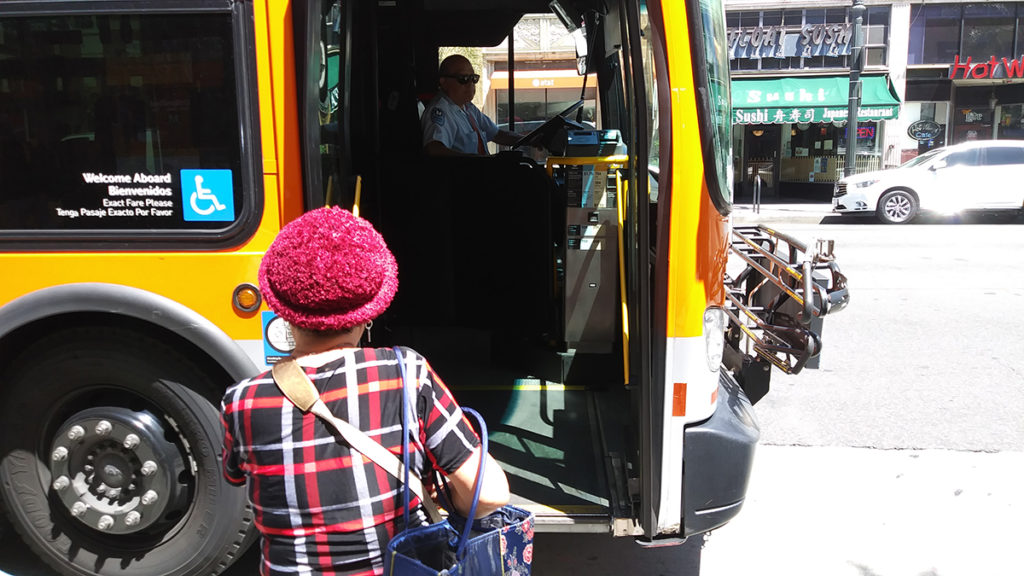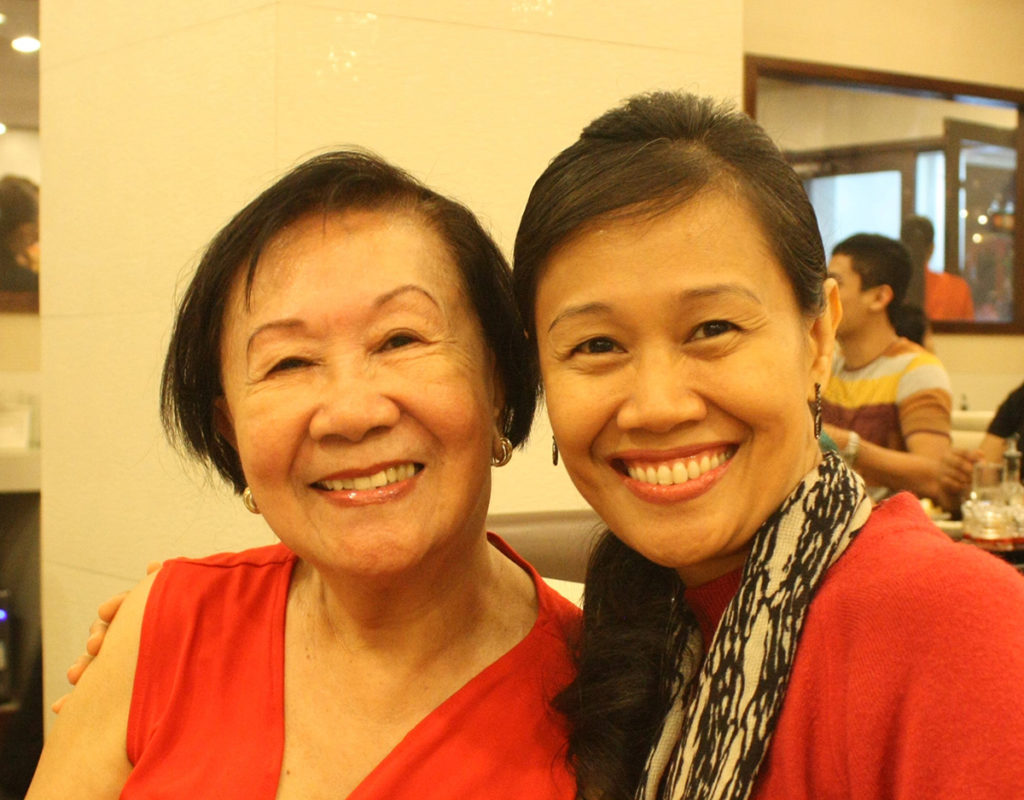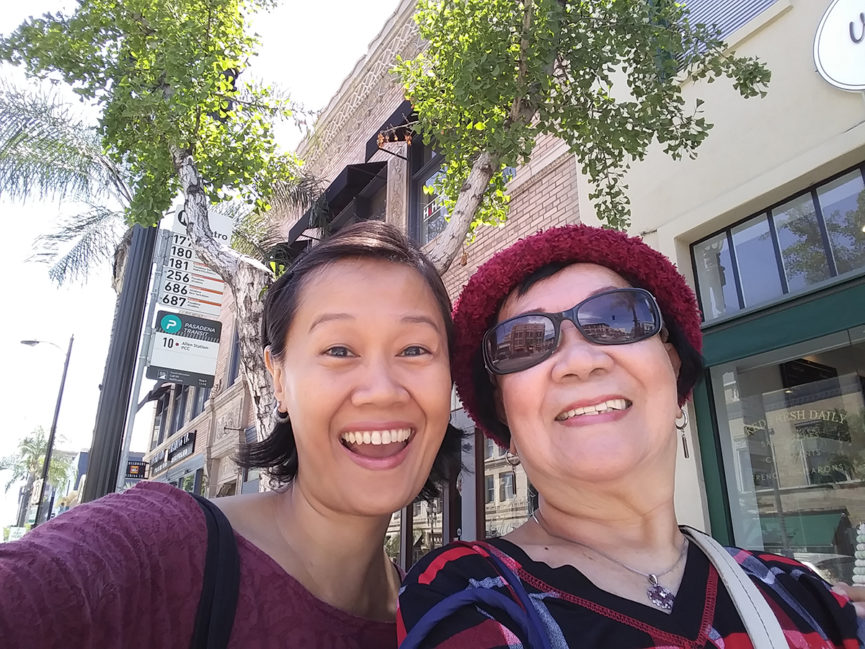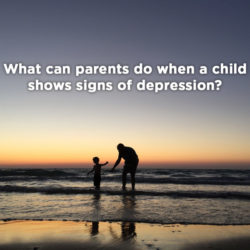The author with her mom, Mrs. Lerma Gumogda
I lost my father to lung cancer almost 23 years ago. Although I helped take care of him, remembering the weeks before he passed on always leaves me with a heavy heart.
One of the most painful realities in life is living with regret. There’s no undoing of wrong choices. That’s why two years ago, when my mother was about to turn 80, I was jolted by the thought that each day that goes by is a day closer to the time mama will leave this world. I don’t want to be caught off guard and be sorry for not loving her enough.
I want to be available for Mama, but this is not easy: She lives in a one-bedroom condo unit in the United States. My brother and sister are also in the U.S., but she prefers to live alone, enjoying her independence. She’s been blessed to be cancer-free for the past 14 years, goes ballroom dancing, plays mahjong, and comes to the Philippines to visit me every year.

Because I live in the Philippines, I cannot visit her anytime I want. I don’t know much about her activities, and I don’t know how she manages herself at home. Not only do we live so far apart, we were also not very engaged in our conversations. Although she visits me in the Philippines every year, my attention has been so divided. So I thought of visiting her in the US last year and really spend time with her, get to know her friends and the places she goes to, etc. In a few weeks, I was reintroduced to my mother, now in her 80s. I saw Mama’s life and discovered her needs when I accompanied her to doctor’s appointments, met her friends, rode the bus with her, watched TV with her, assisted her at home, and taught her how to use a smart phone. I saw the need to move her clothes to a lower shelf so she wouldn’t have to step on a stool. Immersing myself in Mama’s activities bridged me to her world. Every time we talk, I can engage well because I know the people she’s talking about and I can picture the places she goes to. Still, it’s not the same as being present with her when she needs me.

For most of us adult children, loving our aging parents isn’t easy when it’s translated to caring for their progressing needs. I asked some friends to share some thoughts and advice on this subject.
What are some challenges we adult children face when attending to our parents’ needs?
Work commitments, family responsibilities, and living far away make it hard to give aged parents the gift of our presence. For others, finances, illness, parents’ demanding attitude, stubbornness, being “pasaway” especially when they eat prohibited foods, and not admitting they need help, can leave adult children helpless or frustrated.
How then, can we love and honor our parents? What if we have unresolved issues and are discouraged by unpleasant memories with them?
- Remember their love and sacrifice. Let us remind ourselves how our parents took care of us, that they loved us and managed to give us a good life. “Now it’s my turn to take care of them,” said one friend. Another said, “I owe everything I am and have to their sacrifices. There’s no way I can ever repay it.” Even though they’re not perfect, they tried hard to be good parents.
- Focus on the here and now. Build on your common interests rather than picking on differences and past mistakes. Make new, good memories.
- Set your feelings aside. I love them too much that how I feel doesn’t matter.
- Focus on Jesus as your source of encouragement, and pray always. Our perspectives change when we look through the lenses of our faith.
May I add, because we are broken people, there are parents who may have failed and hurt their children at some point. If you struggle with wounding memories, there’s a way to be set free from those. Begin with forgiveness. Maybe your parents were raised in a harsh environment, and so they parented according to what was modeled to them. You don’t have to follow their footsteps. You can honor your parents by first forgiving them, even if they don’t ask for it.

Other ideas on loving our aging parents:
- Drop what you’re doing when a parent needs you.
- Visit often, spend quality time.
- Listen patiently even when stories are repeated many times.
- Don’t parent your parent. Be the child.
- Text and call often so they feel important.
- Return their call ASAP.
- Hug and appreciate them.
- Pray for them in person or over the phone.
- Take them with you to church.
- Share stories of God’s goodness in your life.
- Bring them to doctor’s appointments. Check medical supplies.
- Take them out shopping, or watch movies together.
- Ask for their advice so they’ll feel needed.
- Buy books they can read or audio books they can listen to.
- Download music they love.
- Cook for them, or invite them to dinner. Make sure their food is tender.
- Run errands for them.
- Teach your kids to respect, obey, and be patient with their grandparents.
- Ask them to tell stories about when they were young.
What else can you add to honor your parents intentionally?

Michelle Agustin is happily married to Eric S. Agustin since 1995. Together, they serve as faculty and mentors at the International Graduate School of Leadership (IGSL). Michelle teaches wives from all over Asia and other parts of the world through the Partners in Ministry (PIM) certificate program, a program for wives of men in ministry. She and her husband are blessed with three sons, Nathan, Timmy, and Noah.
Related Posts
-
What Parents Need to Know About Depression
Why does depression seem more commonplace these days? Dr. Lillian Ng Gui, psychologist and Christian…
-
Parents as Identity Builders
Every child's identity is unique, and it is up to the parents to accompany them…
-
What Can Parents Do When A Child Shows Signs of Depression?
What can parents do when a child shows signs of depression? Are there ways to…





This is beautiful!!